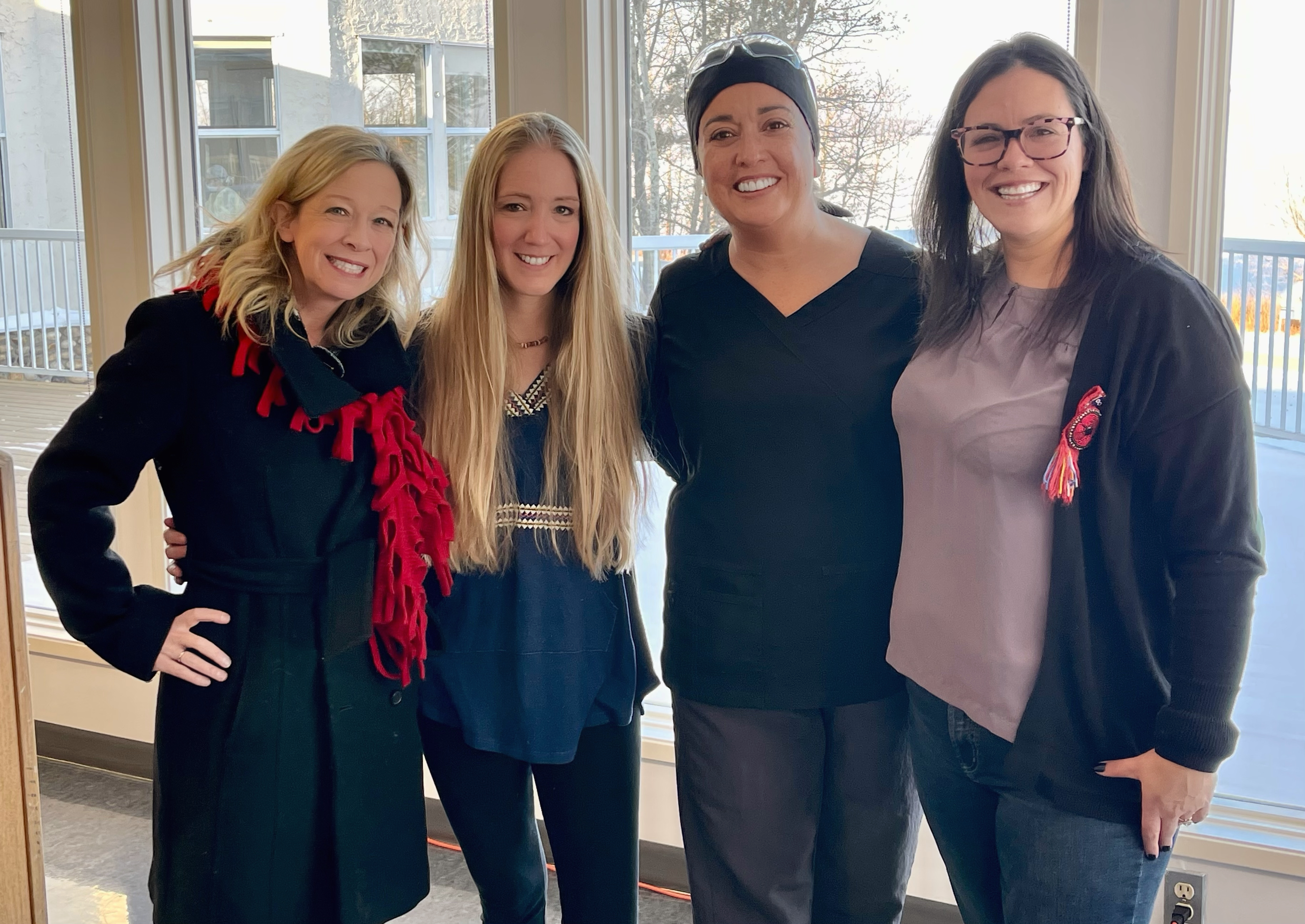Dental hygienist combines knowledge and community connections to remove barriers to oral health
21 June 2023

In photo from left: Suzy DePledge, Lisa Vaughn (Community Wellness Manager with the MNA), Paulette Dahlseide and Reagan Bartel
Paulette Dahlseide (DipDH ‘94, BScDH ‘14) is a busy woman. In addition to being a wife, mother of six and auntie to many, since 2010 she has operated the successful mobile and storefront dental hygiene business she established herself in Cold Lake, Alberta. She does extensive volunteer work with the Métis Nation of Alberta (MNA), of which she is a citizen. She also volunteers with the Alberta New Dawn Métis Women Society, a chapter of Les Femmes Michif Otipemisiwak, and is the recipient of a 2019 Esquao Award. Oh, and she’s working on her master’s degree.
Not bad for someone who found their career by accident.
While a University of Alberta student working toward a bachelor of arts degree in the early ‘90s, Dahlseide agreed to help out a friend from high school who was studying in the School of Dentistry’s dental hygiene program. After spending a couple of hours as a patient in the school’s teaching clinic, she was intrigued. So intrigued, in fact, she left the BA program in her third year to enrol in the dental hygiene diploma. From the time she graduated with that diploma, she has sought ways to improve access to oral health care for those who need it most.
Dahlseide’s dental hygiene career began in a dental office, but it wasn’t long before she ventured out on her own. Having grown up in a small town, she knew how difficult it is for some people to get to a dentist’s office, so when dental hygiene became a self-regulated profession in 2006, Dahlseide saw an opportunity. By 2011, she had established Providence Dental Hygiene, a mobile dental hygiene clinic providing service in the Cold Lake area, where her family had moved when she was in high school and where she still resides. “To be able to go into schools, into health-care centres, and offer services right where people live, work and play is a really important piece to dealing with some of the disparities in health care,” she says.
Owning a travelling clinic may seem like an unusual job option for a hygienist, but business is in Dahlseide’s blood. Her father was already encouraging her to open her own shop on her diploma graduation day, and she’s the great-great-granddaughter of Laurent and Eleanor Garneau, successful business owners and community leaders in early Strathcona, Edmonton. When she began a storefront dental hygiene practice in Cold Lake she began to take things to the next level. “The idea is to reach out to those people that just experience a lot more barriers to traditional care. And that kind of comes in all forms, whether that’s dental fear, dental anxiety, affordability or structural and systematic racism when people try to access services. So I just looked at the public health model and thought, ‘Who truly is it that needs to be served the most?’ knowing full well that’s our own Métis communities,” she says.
Throughout her years in dental hygiene, Dahlseide noticed a lack of representation of the health-care needs of her community. “I recognized even back when I was an undergrad in hygiene there wasn't a lot of Métis-specific oral-health research,” she says.
The chance for her to take a deep dive into addressing this care gap came in 2020. While the pandemic hit her businesses hard, it also made many graduate studies programs more accessible for people living outside major urban centres in Alberta. Once again, Dahlseide seized an opportunity and applied for the master of dental hygiene program at the U of A, which she began in 2021. Now, as a graduate student, she’s able to address the lack of information about her community’s needs to influence change. Using a decolonizing Métis Cree research method — keeoukaywin — she is able to give a voice to Métis women in her kinship network in order to understand the oral health-care experiences of their community.
Kinship and visiting are integral to Métis culture, and upholding these traditions was instrumental in the creation of Access for All (A4A), a dental clinic that is a partnership between the MNA and the U of A School of Dentistry. It was a conversation between Dahlseide and fellow Métis citizens and health-care professionals Reagan Bartel (BScN ‘04, MPH ‘19) of MNA Health and Suzy Depledge, the comprehensive care director with the school, that led to the creation of A4A, and it was the hard work of the MNA to ensure a gathering space was available during the clinics that led to a successful clinic.
“When you allow communities to identify their own needs and their own priorities, and then they are a part of creating the solutions, you end up with more success and more change. And so that program in particular is a perfect example of prioritizing what the community says they need. And so it was not a typical outreach clinic; it was a community,” explains Dahlseide.
The success of the A4A clinic is an example of why it’s important to Dahlseide to use keeoukaywin as the basis of her research. “I'm not focusing on the diseases and the decay rates of our populations,” she says. “Through Indigenous methodologies, I'm visiting to hear what our experiences are as Métis people. By knowing that, you tap into what our resources are, what our strengths are, which then is going to guide the policies and programs that are going to actually succeed.”